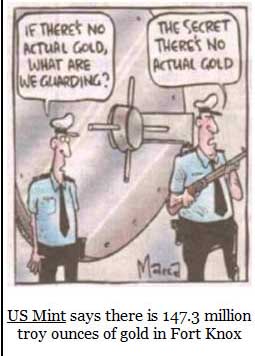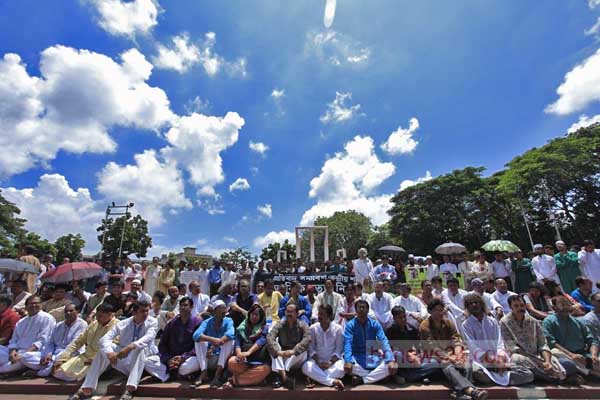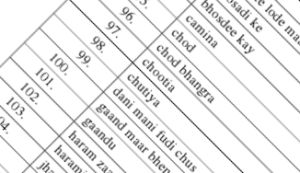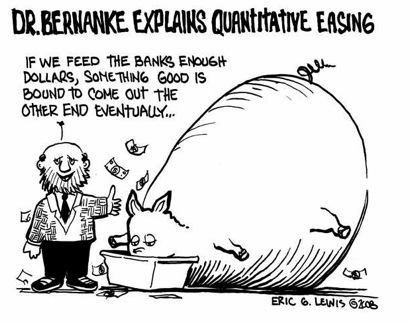By David Bergman
The New Age
Thursday, 2 February, 2012
Five non-governmental organisations have admitted to the World Bank that they made corrupt payments to Bangladesh government officials to receive contracts under a bank-funded project.
The admissions are contained in a report of an investigation which the World Bank?s Integrity Vice President conducted into the disbursement to hundreds of NGOs of part of a $53.3 million loan that the bank had given the Bangladesh government to further post-literacy continuing education.
Four of the five NGOs told World Bank investigators that to get a contract under the project, which lasted between 2001 and 2007, they each had to pay at least Tk 100,000 in bribes to government officials, money that was channelled to the officials through intermediaries.
Some NGOs had to pay as much as Tk 600,000 in bribes to obtain a contract, the investigators were told. Continue reading “WB finds graft rampant in govt, NGOs”
Category: Corruption
Sense of humour failure
Subscribe to ShahidulNews
Censorship in Pakistan
Economist
Nov 25th 2011, 13:04 by L.M.
AN OFTEN overlooked perk of being a country with a large population and relatively low wages is the capacity to employ people to carry out silly tasks. In India, for example, some people spend their days pasting white stickers onto maps of Kashmir printed in foreign publications (such as?The Economist). In neighbouring Pakistan, the regulatory body for telecommunications dreamed up an equally unlikely, if altogether more entertaining, assignment for its staff: to compile a list of ?undesired words? that could be used to block offensive text messages. In a remarkable show of efficiency (to say nothing of creativity), the agency managed to find?1,100 words and phrases in English and nearly?600 in Urdu. (Admittedly they may have padded it out a bit?how else to explain the presence of ?robber?, ?oui? or ?k mart? in a list that otherwise places rather more emphasis on sexual adventurism?)
Last week, the Pakistan Telecommunication Authority?s (PTA) memo and accompanying list of the words sent to mobile-phone service providers were leaked on the internet. Pakistanis were aghast and amused in equal measure. Previous bans have?targeted Facebook,?Rolling Stone magazine?s website and the use of encrypted networks. These met with limited opposition. But the directive to block text messages containing certain words was seen as an attack on free speech.
The official reason for the ban was ?to control the menace of spam in the society?. Far more likely, the authorities finally grew tired of rude anti-government jokes that circulate widely via text message. Many feature the president, Asif Ali Zardari, in a starring role. (A tame example: ?The post office issued new stamps with Zardari?s face on them but they had to be withdrawn because the public found them too confusing: it was impossible to tell which side to spit on.?) Texting is perhaps the most effective means of mass communication in Pakistan: two of every three Pakistanis have a mobile phone and the cost of sending an SMS is among the cheapest in the world. Following public uproar, damning editorials and the threat of legal action from NGOs, the authority sheepishly announced that ?implementation of previous PTA instructions have been withheld? after it ?received input from customers, government and other quarters on this issue?.
The government?s inability to take a joke isn?t restricted to text messages. In an interview with the state broadcaster on November 21st, the UN?s ?world television day?, the information minister, Firdous Ashiq Awan, stressed the need for a code of conduct to help broadcast media through an ?evolutionary phase?. There is little doubt that Pakistan?s news channels could do with some restraint, especially when it comes to coverage of terrorist attacks, which tends towards the gory. But critics fear that an enforced code of conduct would use obscenity as an excuse to target the hugely popular political satire programmes that make fun of the nation?s ruling classes. ?It?s anti-government stuff, impersonations of Zardari and company?they don?t leave anyone alone. They make all kinds of jokes, some of them quite lewd,? said Murtaza Razvi, a senior editor at?Dawn, a leading English-language newspaper.
Pakistan?s broadcasting rules were liberalised under Pervez Musharraf soon after he took power in a military coup in 1999, and the number of television channels quickly grew from a single state broadcaster to nearly a hundred channels. The government would do well to draw a lesson from the experience of Mr Musharraf, who tried to clamp down on press freedom in 2007 and found himself out of office soon after. Mr Zardari may not enjoy being the butt of jokes every night but it certainly beats having angry?protesters on the streets of Islamabad.
CONCLUDING PART: The Federal Reserve Bank. America's privately-owned central bank
Subscribe to ShahidulNews
By rahnuma ahmed

It is not only the American corporate media which keeps the lid on the Federal Reserve System — since, contrary to what most ?Americans believe, it is `not federal’, has `no reserve’, is `not even a bank’ but actually a banking cartel which serves and furthers the interests of the wealthiest men in the world ? American universities too play their role. As Stephen Lendman points out, his MBA curriculum 46 years ago, had `left out the most important parts of the story and never hinted at anything sinister about how the banking system works in fact’ (The Federal Reserve, Z Magazine, June 29, 2006).
A similar situation seemingly prevails in the UK, for, when I asked a relative who teaches business and finance at a British university about who owns the Bank of England, I was told, its nationalised. Its a public organisation wholly-owned by the government. ?Corroborating the official storyline secured in place by the powers-that-be, reflected in the Bank’s website: ?’As a public organisation, wholly-owned by Government, and with a significant public policy role, the Bank is accountable to Parliament.’
But this account ? unfailingly subscribed to by most Brits, `You ask the question, Who Owns The Bank Of England? to one thousand Britons, and I kid you not, all of them will say that it is owned by the Government’ (The Tap Blog, February 27, 2010) ? glosses over actualities. For instance, the setting up of? a wholly owned subsidiary called Bank of Nominees Limited (BOEN), a private limited company, by the Bank of England in 1977, which was granted an exemption from disclosing its shareholders. ‘It was considered undesirable that the disclosure requirements should apply to certain categories of shareholders.’ This exemption is separate to the fact that the Bank of England is also protected by its Royal Charter status, and the Official Secrets Act. To put it briefly, members of the British public are ‘not allowed to know who the shareholders are who own the company which carries out Central Banking in the UK.’ Continue reading “CONCLUDING PART: The Federal Reserve Bank. America's privately-owned central bank”
Part I: The Federal Reserve Bank. America's privately-owned central bank
Subscribe to ShahidulNews

By rahnuma ahmed
“I know you are very busy, but you must make time. I have something very important to tell you,” I insisted.
Later, sitting in Nurul Kabir’s office, I asked, did you know that the American Federal Reserve Bank is privately-owned?
Wha-at? No! How?
I spilled the beans: the Fed (as its known for short), America’s central bank, is actually not a central bank, its not government-owned, its actually a banking cartel, the American government doesn’t create, doesn’t print money, this banking cartel does it, and the US government is indebted to it, and Americans are taxed to pay off the interest to this cartel, and the interest is just huge, a staggering amount in trillions of dollars, talk of shudkhors (usurers), its an unbelievable scam, American people generally don’t know about it, the media doesn’t talk about it, it’s a huge big cover-up… I went on excitedly till I ran out of words.
A long pause, then I reeled off the names of some leftists, friends we have in common, and asked Kabir, do you think our anti-imperialist friends, very critical of American capitalism, and for good reasons too, know this? The real story?
No, came the immediate reply. Since I didn’t, I’m sure they don’t either. Oooh, how conceited, I yelped, as I took a long sip of tea, which had gone cold as I gabbled. We laughed, and I moved on to describe how I had come across this extraordinary tale. Continue reading “Part I: The Federal Reserve Bank. America's privately-owned central bank”
Simmering discontent
Subscribe to ShahidulNews
Eid at Shaheed Minar
by rahnuma ahmed

We’d mourned deaths from road accidents at central Shaheed Minar earlier as well.
When we rallied in support of Viqarunnisa students protesting against school rape, we had risen to grieve for 39 people killed, including 38 schoolboys, in the Mirsarai road accident on July 11, four days ago.
Since then, road deaths, according to some, have risen and reached `epidemic’ proportions. The country’s roads are `death traps.’ `Mass killings’, `serial killings’ are how others describe it.
Public anger at spiralling road fatalities has been fuelled by the visible lack of regret and remorse by Abul Hossain, the communications minister, by the prime minister rushing to his defense, reiterating that no, the cabinet would not be reshuffled, `all the ministers are working hard to carry out their responsibilities’ (The Daily Star, August 26, 2011).
And, all this has taken place after August 13th, when Tareque Masud, internationally acclaimed filmmaker, Mishuk Munier, journalist and CEO of the private TV channel ATN News, and 3 others were killed in a road accident in Manikganj.
Continue reading “Simmering discontent”


